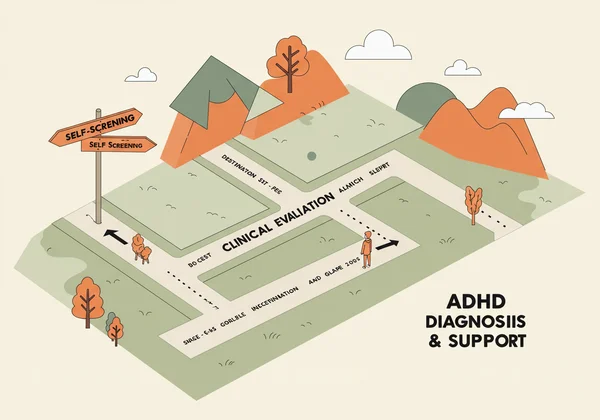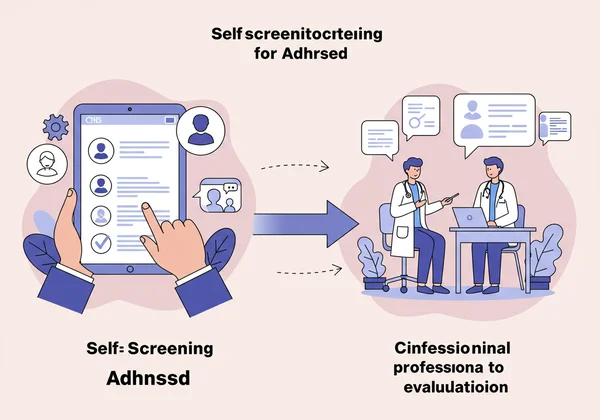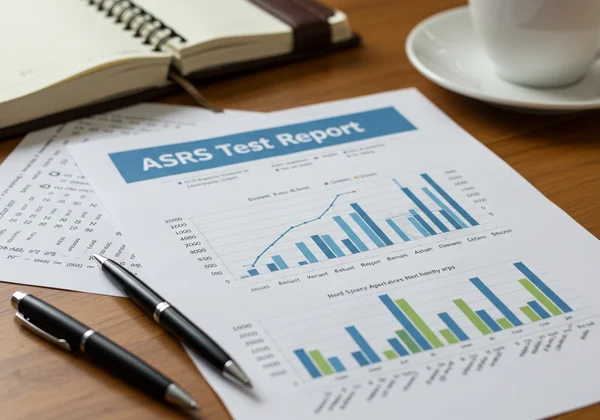ASRS Test: Explore Adult ADHD: Your Diagnosis Roadmap
September 15, 2025 | By Miles Harrison
So, you've completed an ASRS test. You’ve looked at the results, perhaps from our AI-powered report, and now you're standing at a crossroads, wondering, what are the next steps on this journey? Feeling uncertain is completely normal. A self-screening is a powerful first step toward understanding yourself better, but it's not the final destination. This guide is your roadmap, designed to help you navigate the path from self-discovery to a formal adult ADHD diagnosis with confidence and clarity.
Taking that initial step is often the hardest part, and you've already done it. If you haven't yet explored your symptoms, you can start your journey here with a confidential screening tool. This roadmap will illuminate the path ahead, detailing the process, helping you find the right professionals, and preparing you for what to expect. Let's walk through it together.

Your Journey Begins: The Adult ADHD Diagnosis Process
The path to understanding adult ADHD is a process, not a single event. It begins with a spark of curiosity or concern and moves toward a comprehensive professional evaluation. Recognizing this distinction is key to managing your expectations and navigating the system effectively. The goal is not just a label, but clarity and access to the right support.
From Self-Screening to Clinical Evaluation
Think of an ASRS test as a highly effective and scientifically validated signpost. Developed in partnership with the World Health Organization (WHO), it points you in the right direction by helping identify patterns and behaviors consistent with ADHD symptoms. It’s a crucial tool for self-reflection and provides a structured starting point. However, it is not a diagnosis.
A clinical evaluation is the comprehensive assessment conducted by a qualified healthcare professional. This is where a formal diagnosis is made. It involves a much deeper dive into your personal history, symptoms, and the impact they have on your daily life. The screening tool gets you to the door of the clinic; the evaluation is what happens once you're inside.

Why Seek a Formal Diagnosis for Adult ADHD?
Pursuing a formal diagnosis is a personal decision, but it can unlock significant benefits. For many, receiving a diagnosis is incredibly validating. It provides a name for lifelong struggles that may have been mislabeled as laziness, carelessness, or a character flaw. This understanding can profoundly shift self-perception and boost self-esteem.
Beyond validation, a diagnosis is often necessary to access professional support and accommodations. This can include therapeutic strategies like cognitive-behavioral therapy (CBT), coaching, and, if appropriate, medication. It may also open the door to workplace or academic accommodations that can help you thrive. A diagnosis provides a framework for building effective coping strategies tailored to your unique brain wiring. If you're considering this path, an ADHD self-assessment can be a great place to start.
Finding the Right Specialist: Who Can Diagnose ADHD?
Once you decide to seek an evaluation, the next critical step is finding the right professional. Not all healthcare providers specialize in adult ADHD, so it's important to connect with someone who has the right expertise. This ensures you receive an accurate assessment and a care plan that truly meets your needs.
Types of Healthcare Professionals for ADHD Assessment
Several types of professionals are qualified to diagnose adult ADHD. Here are the most common ones:
-
Psychiatrists: These are medical doctors (MDs) who specialize in mental health. They can conduct comprehensive evaluations, provide therapy, and are licensed to prescribe medication. They are often a top choice for ADHD assessment.
-
Psychologists: Clinical psychologists (Ph.D. or Psy.D.) are also highly qualified to diagnose ADHD. They perform in-depth psychological testing and assessments and offer various forms of therapy. They do not prescribe medication but can work with your primary doctor or a psychiatrist if medication is recommended.
-
Neurologists: These specialists focus on the brain and nervous system. While some neurologists diagnose and treat ADHD, it's more common for them to be involved when other neurological conditions need to be ruled out.
-
Primary Care Physicians (PCPs): Some family doctors or general practitioners are comfortable diagnosing and managing uncomplicated cases of adult ADHD. However, many will refer you to a specialist for a more thorough evaluation.
![]()
Key Questions to Ask Potential ADHD Specialists
To find the best fit, it’s helpful to be prepared with questions. When you contact a potential provider's office, consider asking the following:
- Do you have specific experience in diagnosing and treating adult ADHD?
- What does your assessment process for adult ADHD involve?
- How long does the evaluation process typically take?
- What are your fees, and do you accept my insurance?
- Do you provide follow-up care and treatment after the diagnosis?
Finding a specialist you feel comfortable with is essential. This is a collaborative process, and a strong patient-provider relationship is the foundation for successful management.
Preparing for Your ADHD Doctor Visit
Your appointment for an ADHD doctor visit is a crucial opportunity to share your story. The more prepared you are, the more productive and helpful the session will be. A little groundwork beforehand can make a significant difference in helping your doctor understand your experiences and challenges.
What to Gather: Your Symptoms and History
Before your visit, take some time for reflection and organization. Your doctor will want to understand your symptoms and history, so compiling this information is key. Create a list of the specific challenges you face, with concrete examples from different areas of your life—work, home, and social settings.
Think about your past as well. ADHD symptoms must be present before age 12 for a diagnosis, so try to recall challenges you faced in school or childhood. If possible, old report cards with comments like "doesn't work to potential" or "is easily distracted" can be very insightful. The goal is to paint a clear picture of a persistent pattern of behavior.
Utilizing Your ASRS Test Report
This is where your initial screening becomes an invaluable tool. The AI-personalized report you can receive from our online ASRS test is more than just a score; it's a structured summary of your self-reported symptoms. It organizes your experiences in a clear, concise format that aligns with clinical screening criteria.
Bring this report to your appointment. It can serve as a powerful conversation starter, helping you articulate your concerns without forgetting important details. Handing your doctor a document that outlines your response patterns can help focus the conversation and ensure your key challenges are addressed. It shows you've done your homework and are proactively engaged in your health journey. It transforms your abstract feelings into concrete data points for discussion.

Understanding What to Expect in an ADHD Assessment
Knowing what to expect in an ADHD assessment can help reduce anxiety and empower you to participate fully in the process. A comprehensive evaluation is a multi-faceted process designed to gather a complete picture of your functioning. It is thorough for a reason: to ensure an accurate diagnosis and rule out other conditions that might present with similar symptoms.
Common Assessment Methods and Tools
A professional assessment typically involves several components. A clinical interview is almost always the central element, where the clinician will ask detailed questions about your symptoms, developmental history, and life experiences.
They will likely use standardized assessment methods and rating scales—some of which you may fill out, and others that a spouse, parent, or close friend might complete to provide an outside perspective. Additionally, the evaluator may review your medical history and conduct a physical exam to rule out other causes for your symptoms. In some cases, cognitive testing may be used to assess functions like working memory, processing speed, and executive functioning.
Interpreting Diagnostic Criteria for Adult ADHD
Clinicians use a set of standardized diagnostic criteria to determine if you have ADHD, most commonly from the Diagnostic and Statistical Manual of Mental Disorders (DSM-5). For a diagnosis, you must exhibit a persistent pattern of inattention and/or hyperactivity-impulsivity that interferes with your functioning or development.
The criteria require that several symptoms were present prior to age 12 and that these symptoms are present in two or more settings (e.g., at work and at home). The clinician’s job is to synthesize all the information gathered—from interviews, rating scales, and your personal history—to see if your experiences align with these established criteria. A diagnosis is made based on this comprehensive picture, not just a single test score.
Empowering Your Next Steps Towards Clarity and Support
Navigating the path from an initial ASRS screening to a potential ADHD diagnosis is a significant journey of self-discovery and advocacy. It starts with questioning and leads to clarity. Remember, the goal isn't just to get an answer but to better understand how your mind works and to find the strategies and support that will help you thrive. Each step, from taking a free ADHD test for adults to preparing for your doctor's visit, is a move toward empowerment.
You've already started this important process. Continue to be curious, be your own best advocate, and know that seeking answers is a sign of strength. The road ahead may have a few turns, but it leads to a destination of greater self-awareness and a more supported future. We encourage you to use the resources available and take the first step toward understanding your unique profile.
Frequently Asked Questions About Adult ADHD Diagnosis
Is it worth getting a formal ADHD diagnosis as an adult?
Absolutely. Many adults find a formal diagnosis to be life-changing. It can provide validation for past struggles, improve self-esteem, and grant access to treatments, therapies, and accommodations that can significantly improve quality of life at work, school, and in personal relationships.
How accurate is the ASRS ADHD test for initial screening?
The Adult ADHD Self-Report Scale (ASRS) is a highly reliable and scientifically validated screening tool developed by the World Health Organization. While it is very accurate for identifying adults who may have ADHD and should seek further evaluation, it is crucial to remember it is a screening tool, not a diagnostic instrument. A formal diagnosis can only be made by a qualified healthcare professional.
What age is the ASRS test designed for?
The ASRS v1.1 is specifically designed and validated for adults aged 18 and older. It helps identify symptoms of ADHD as they present in adulthood, which can often look different from childhood ADHD. You can try our free tool to see how it works.
How do I talk to my doctor about potential ADHD symptoms?
Be direct and prepared. Start by saying, "I have some concerns that I may have symptoms of adult ADHD, and I'd like to discuss them." Bring a list of your specific symptoms with real-life examples. Bringing your completed ASRS test report from a reliable online screening tool can provide a structured, data-driven starting point for a productive conversation.